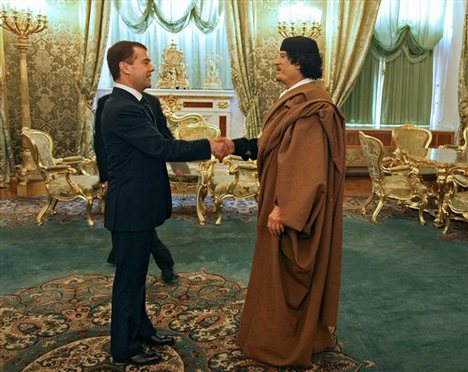
The Kremlin Spins Conspiracy Theories Explaining Revolutions Away
Publication: Eurasia Daily Monitor Volume: 8 Issue: 40
By:

The shockingly violent civil war in Libya has pushed the Russian leadership to re-evaluate the nature and the impact of the revolutions that keep shaking the Arab world. Worries in the Kremlin are very different from concerns in Washington about the departure of such loyal allies as Hosni Mubarak and the probable rise of Islamic fundamentalism, and from the panic in Europe about the huge wave of migrants coming across the Mediterranean. President Dmitry Medvedev issued a short statement last Friday afternoon condemning the use of force against civilians in Libya, but much of the previous assessments indicate that the Russian rulers sympathize and perhaps even identify with the beleaguered dictators (Kommersant, February 26). Bizarre remarks uttered by Deputy Prime Minister, Igor Sechin, Prime Minister, Vladimir Putin, and Medvedev testify to the urgent political need to explain away the triumphs of people’s power.
The proposition that the middle classes could rise against well-established autocrats is too disturbing for the “bosses-R-us” mindset, so all sorts of conspiracy theories are spun in order to deny the obvious. Sechin argued that high-ranking managers of Google manipulated public energy in Egypt, while asserting that political stability in Russian was one of the highest in the world (Vedomosti, February 22). Putin suggested that the North African division of al-Qaeda was implicated in the Libyan uprising but insisted that “we should not interfere in their affairs by any means” (Rossiyskaya Gazeta, February 25). Medvedev warned that “the arrival of fanatics into power” may lead to “the disintegration of large, heavily populated states, their break-up into smaller fragments.” What these dark fantasies have in common is the conviction that some evil external forces are pulling the strings of mass uprisings (www.gazeta.ru, February 25).
The point of entry for these forces into Russia is found in the North Caucasus where escalation of violent discontent is indeed breaking out of control. Medvedev informed the National Anti-Terrorist Committee at an emergency meeting in Vladikavkaz last week that “a number of countries – countries with which we even have friendly relations – are nonetheless involved in the terrorism that we see in the Caucasus.” The key point of the meeting was to boost security measures for the tourist centers in Kabardino-Balkaria that had been attacked for the first time in the previous week (Nezavisimaya Gazeta, February 22). Police forces were re-deployed closer to mountain resorts, and a few days later Nalchik saw a series of bold attacks on law enforcement buildings (Kommersant, February 26).
Medvedev tries to reinvigorate the siloviki by sacking mid-level police generals and even a deputy director of the FSB; he has also replaced the head of Karachaevo-Cherkessia for poor efforts in economic development, while tensions in this republic still remain manageable (www.newsru.com, February 26). These cadre reshufflings make little difference in the administrative system based on converting power into profit, while Medvedev’s personal inspections of airports and train stations only demonstrate that no efficient defense against terrorism could be invented (Novaya Gazeta, February 26). It is the growing understanding of futility of the two-track strategy of buying stability and exterminating rebels that feeds the official readiness to subscribe to the preposterous “American-Turkish conspiracy” (Vedomosti, February 25).
This interplay of conspiracy theories focused on the revolutions in North Africa and rebellion in the North Caucasus clashes with the fledgling ideology of “modernization,” which Putin has never really embraced. He is not questioning directly the rationale for building a “partnership for modernization” with the states that instigate instability in Russia’s “soft underbelly” but the emphasis on fundamental mistrust in the West’s strategic intention is unmistakable. This perceived divergence of interests implies that Russia must rely on and build up its own strength, and while the military rearmament will take at least a decade, the energy levers could be applied without delay (www.lenta.ru, February 25). In fact, the turmoil in Libya has not only propelled oil prices but also reinforced Russia’s position as the major supplier of gas to Europe, and Putin was eager to utilize this new strength in the talks with the EU top executives in Brussels last week (Kommersant, February 25). His public bickering with the President of the European Commission, Jose Manuel Barroso, might appear to concern the technicalities of the so-called “third energy package” but in fact Putin has launched a new offensive aimed at curtailing the EU strategy of liberalization of the European gas market (Nezavisimaya Gazeta, February 25).
This proactive energy policy seeks to exploit the apparent disunity in the European Union caused by the incongruous recession but its irreducible weakness is determined by the well-deserved reputation of unreliable supplier (www.forbes.ru, February 22). Even the European energy “champions” with long experience of doing business with Gazprom and Rosneft have to take into account new risk factors related not to Putin’s propensity to squeeze non-resident investors but to his uncertain control over Russian political transformation. The smoldering civil war in the North Caucasus may have only marginal impact on the energy business, at least as long as the rebels are not targeting the oil and gas infrastructure in the Novorossiysk export hub. Greater risks are related to the growing public dissatisfaction and irritation with the deeply corrupt system of governance; this discontent is clearly registered by opinion polls and cannot be diminished by the tightly manipulated elections (Vedomosti, February 22; www.gazeta.ru, February 26).
It may look ridiculous when in a public debate facts on shameless corruption in the vast state bureaucracy are countered with revelations that several thousand bloggers are working on instructions from the US embassy for the destabilization of Russia (www.gazeta.ru, February 24). It is in fact no greater departure from the political reality of crumbling Putinism than Medvedev’s assertion that “this plot will not work,” which he starts – perhaps sub-consciously – with the imperative “We must face the truth.” Russia is certainly very different from Egypt or Libya, and the energy of protests may be sapped by the bitter disappointment in the democratic expectations of the 1990’s, but the lesson in ousting a rotten despotic regime by saying “No” is perfectly applicable.




